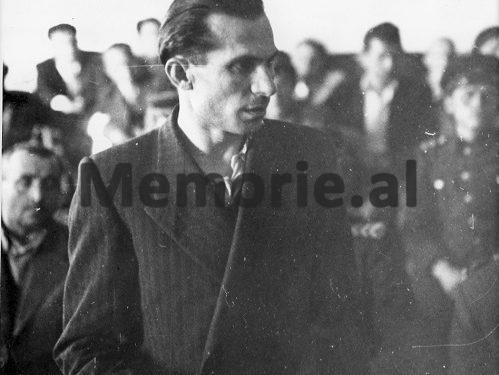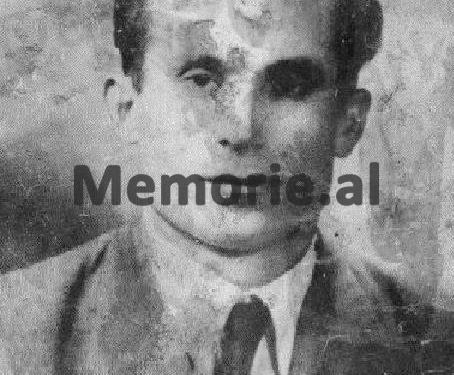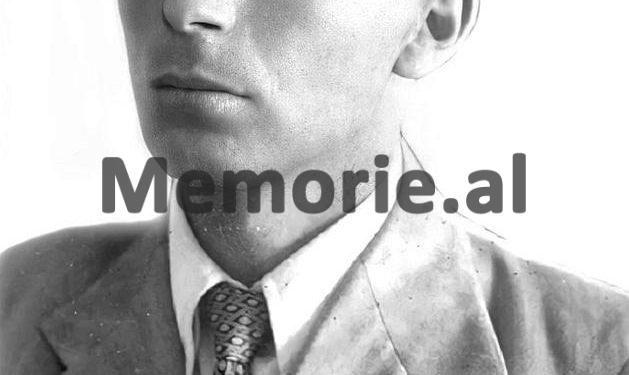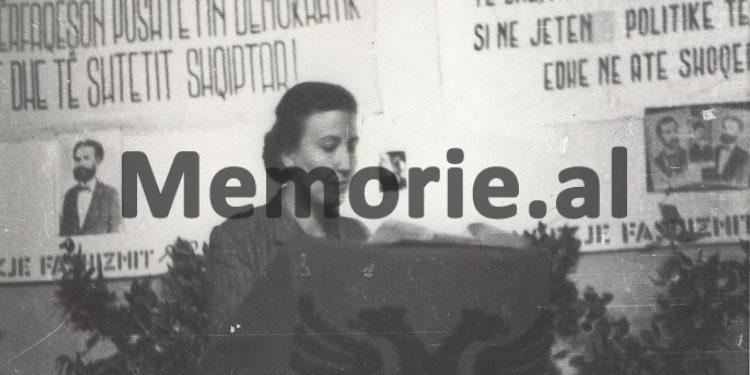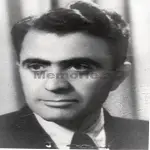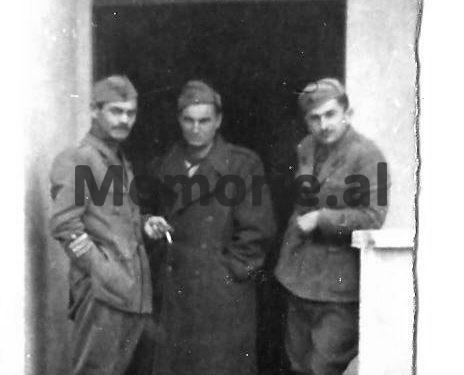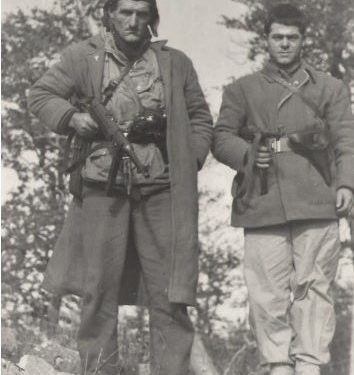By Gjergj Titani
The seventh part
Memorie.al / For the first time, we have been able to provide the witness account of many historical events. The conversation with Pandi Kristo, a senior figure of the Communist Party of Albania and the Albanian state, took place in Tirana, in the house of his son-in-law, Robert Vullkani, where he was forced to live, when he was released from exile, since the Albanian democratic state, never gave him a home. The regime, for which he fought, targeted him to liquidate Pandi Kristo, placing him in the group of Koçi Xoxes, convicted for “hostile activities”. For 42 years in a row, I would wander the prisons of the communist dictatorship and successive exiles, until communism was overthrown forever, at the beginning of the 90s. The interview was conducted in 1992 – 1993 and over the years, it was completed, according to the memories and family archive of Pandi’s daughter, Assembly Kristo (Vullkani), sister, veteran of the Anti-Fascist National Liberation War, his son-in-law, Robert Vullkani, and the memories of many contemporaries. Here is Pandi Kristo’s confession.
Continues from the previous issue
Mr. Pandi, what happened after the proceedings of the Second Plenum, which was the last after the activities that took place in Berat?
After these very important activities, we prepared to enter Tirana with a natural and legal festive ceremony. A little while ago, we had sent Nesti Kerenxhi to the capital, to ensure the safety and calmness of the Government’s entry there. Also, Abdyl Këllezin, as the all-powerful for organizing the placement of new officials, who were coming to the liberated Tirana in hotels, dormitories, barracks, villas, residential houses, kitchens, canteens. The supply of products and food, which were lacking at that time, could only be afforded by a resourceful and active man like Abdyli. Liri Belishova, another envoy, would deal with the organization of youth, women, propaganda, printing, slogans and others. All three of these friends did a colossal job for the systematization and accommodation of the New Government.
Let’s remember that, the government that had emerged from an armed war, had nothing at its disposal, neither offices, nor furniture, nor printing tools, nor budget, treasury, or anything else, except the will and willingness to lead Albania newly liberated. Those days, in addition to party duties and other functions, I was appointed Political Secretary of the Tirana-Durre District Party Committee. My deputy, for the field of organization, was my good friend, Gogo Nushi. Meanwhile, the head of agitation and propaganda of this committee was Xhavit Qesja. The instructor for the woman was the old communist, originally from Najdenët e Dibra, our friend Meribani, who later became the wife of Xhavi Qeses. I want to emphasize that Xhaviti, in most of the meetings of the Bureau, or the secretariat of the Central Committee of the KPSH, was a participant and meticulously, calligrapher as rarely, kept the protocols and the main documents. The instructor for the youth was Pirro Dodbiba.
I remember that we had two or three other employees and that was it. I can say with conviction that in those days, we were not bothered by excessive bureaucracy. The party committees and ministries consisted of small operational groups of enthusiastic workers, who came from Lufta, from partisan units, or city and district committees. In this committee, which was actually the largest and most important in the country, we had work 24 hours a day, and I remember that we mostly worked in the field, making direct contact with the few enterprises, private or state, that were in that time. The most urgent task was to clean the city, which still had the traces of the war in the streets. I am happy to say that the operative group consisting of Abdyli, Nesti and Liria, had done a colossal job of mobilizing the citizens and partisans of the units deployed in the capital, who had done almost everything.
Even Mehmet Shehu and the Operative Headquarters, which led the liberation of Tirana, prepared the first parade of the victorious forces in front of the New Government, the people of the capital and the representatives of the allies who had already been accredited to the General Command. Later, I was appointed chairman of the State Control Commission, which was placed with offices in the three-story house of the Kacels, which still exists today in the center of Tirana. Demush Thaçi was the vice-chairman of the NKSH, while Spiro Gjoka, Naum Stralla, and others were the collaborators, who helped in those difficult days with all their intellectual and professional powers. Naum Stralla, a former senior member of the Communist Group of Korça and then of the KPSH, through a private Italian pharmaceutical firm, enabled the import of a large number of medicines that we needed in the war.
With the care and skills of Stralla, we have been supplied almost regularly and without problems, with the help of a well-organized network of different pharmacies, which without hesitation, forwarded all our requests to the mountain. This service, thanks to Naum’s work and dedication, functioned throughout the War without a hitch…! I remember that I completely lacked the practice of running such an important department, but with the help of my colleagues, Gogo Nushi, Xhavit Qese, Meriban Najdeni, Demush Thaçi, Naum Stralla, and others, I was able to successfully cope with this difficult task. I cannot fail to mention that, when I was a minister without portfolio, Enver Hoxha left me the right of signature and seal. Also, I noticed that many decisions, or executive orders, with great responsibility, he hesitated to sign them himself.
So, I was convinced that this work practice, Enveri, did to remove the responsibility from himself, so that later if this or that problem turned out to be unsuccessful, he would have the right to contest it. I was impressed that Enveri no longer worked in the office, but in an environment that he prepared at home. Even the meetings of the Political Bureau were held at his house. This is where his later, paranoid claims begin, that allegedly at this time the “Koçi Xoxes group” had isolated him. I sincerely ask, from whom was Enveri isolated?!
These claims, not only do not stand, but are the inventions of his sick brain, because Koçi and Enver, initially ate together, and the same cook cooked for both families. At this time, I also ate more at his house than at my family, which I had brought from Korça. It should not be forgotten that with Enver, we lived in the same yard. Also, Koçi and Nako regularly acted like this. Enver raises these claims without basis, because he was not isolated from anyone, but isolated in his tower.
How did you get settled in your house in New Tirana, when you were neighbors with Enver and Koçi
Although this is not of any particular importance, I can say that, initially, I lived with my family, in a courtyard with Enver Hoxha and Koçi Xoxen. Our relations were very good. We came to each other freely, without shyness and without special ceremonies. Right at this time, Enveri, I don’t know for what reason, started not going to the office and as I said a little above, he isolated himself. Was it the feeling of fear, or excessive caution, I can’t say for sure? He and Nexhmija still had no children. Me and Dhora, my wife, had a great joy, because a daughter was born to us, whom Enver often caressed, took her in his arms, and was happy for her.
On the third day of her birth, according to Orthodox custom, a wave bread was prepared, with butter and sugar. This rite is called “the third”. On the same day, the name of the newborn is also given. Of course, we weren’t going to the church or anywhere else to celebrate this ceremony, but the occasion was found. I remember that on that day we were conducting the work of the Constitutional Assembly. I, Enveri and Koçi, returned to my house to congratulate my daughter’s grandmother, my wife’s mother, whom we called Mitera, because my mother was killed in the demonstration of September 9, 1943.
Also, we would like to congratulate my wife, Dhora, my sister, Vangjeli and brother Kosta, who were members of my family and lived with me. On this occasion, Koçi Xoxe explained to Enver what was the “wave bread” of the newborn and the “thirds”. Immediately Enveri said: “We will call the girl Assembly, exactly today on the occasion of the first meeting of the Constitutional Assembly. So, it was decided. My daughter was baptized by Enver. It still bears this name to this day. Thanks to the tragedies that happened to me afterwards, we did not have the good fortune to enjoy other children, so this strange baptism of Enver followed us all our lives. I remember that my mother-in-law, that day and later, was extremely sad because she could never accept the name that Enver gave her.
I remembered another case, which has to do with my relations with fellow leaders. In the summer of 1941, I became engaged to Dhora Nedelli, who later became my wife. That was not the time for engagements and marriages, so we got married immediately after liberation. At the end of 1944, we celebrated the wedding. On the same day, Hysni Kapo and Vito Kondi also celebrated their wedding. On this occasion, both parties witnessed the celebration of marriages. Thus, simple, without ceremonies, was the wedding at that time. Immediately after this act, I left the “Dajti” hotel, where most of the leadership was located, took my family and settled in the house I mentioned a little above.
Did other visitors, friends of the leadership, come to your home, Enver’s, or Koç’s
Of course, they were coming. The doors of our houses were open to everyone. For four or five years we were roaming like illegals through the bases of the war, police cells and prisons, the rifts of the war in the mountains. For a while, we were not allowed to take off our partisan uniforms, but we got used to civilian suits, ironed trousers, ties, collared shirts, and even started wearing borsalino hats. One of the frequent visitors, welcomed and very charming to us, or even to Enver, was professor Sejfulla Maleshova. This fact had also caught Nexhmije Hoxha’s attention, so one day she told me without hesitation: “Listen, friend Pandi, Sejfullai is single and we thought it would be good to marry him to Sano, Enver’s sister. What do you think? Can you tell this to Sejfullai”?
Of course, the sky fell on my head, because first, I was not used to dealing with such work. I was surprised by Nexhmija’s courage. Moreover, I was and still am in my old age a very serious person, closed by nature and of few words. I am a gloomy person, but by no means rude. I don’t understand why Nexhmija entrusted me with the transmission of this message to Sejfullai. Anyway, Sejfullai had told us that Enver’s sister often brought him a red rose in the small pocket of his jacket. “Desert, you think of throwing your claws at me, the seasoned bachelor”, said Sejfullai and laughed out loud. I had a major order, already from Nexhmija. I did what I did, I conveyed her request to Sejfullai. “Old fox” he said and added: “Listen Pandi, I am not left for Enver’s alms. I never do anything with him”.
In this case, I understood very well that he did not sympathize with Enver Hoxha at all. I think this conversation no longer needs comments and I apologize for mentioning people who are not related to our issues.
Do you know about the execution of Bahri Omar, Enver Hoxha’s brother-in-law? How could the latter not save him from the death penalty?
Bahri Omar, although he had been the Minister of Foreign Affairs during the occupation, may not have been given the capital punishment, because he had made a valuable contribution to the continued and safe shelter, he had given to Enver and his family. during the war. But, Enver’s strange and complex circumstances caused Bariu to be sentenced by firing squad. The case brought him to know the circumstances in which this man was executed. It was the time of the development of the Special Trial of war criminals. Koçi Xoxe, was the president of this very important trial, which was not taking place just by the desire or the decision of the new Albanian Government.
Of course, I had nothing to do with the trials, not that I wouldn’t participate if the Political Bureau assigned me, but that’s how the events unfolded. I remember that one day, when the Special Trial was taking place, Koçi Xoxe told me that Farija, Enver’s sister, had gone to his house and begged to spare the life of Bahri, her husband. Surprisingly, Enver, contrary to the special instructions he had given to Koçi for the shooting of Bahri Omar, had said to his sister: “Look at Farije, only Koçi can handle this job”. Farija, with Enver’s words, left with a sigh to Koçi, to whom he relayed what his brother had told him. Koçi, of course, was surprised by this foxy maneuver of Enver Hoxha, but with his characteristic sincerity, he did not hesitate to tell him: “Listen Farije, your brother has not told you the truth. Only he can handle this job.”
After this conversation, Koçi came to me and told me the great plight of Farija, who was right. Then we both got up and went to Enver’s house and interceded for our sister’s plight. He told us: “There is no easing of the class war. He too, Bahriu, should be shot like all the others”. On this particular occasion, I saw Enver’s true face once again. That’s all I can say about this issue that caused a stir at the time and was much discussed afterwards.
Can you tell us how you bumped into the Soviet ambassador just before a delegation headed by you was to leave for Moscow?
It may seem strange, but while my friends had been abroad several times, I could not go to any delegation. In fact, I never had any contact with the Yugoslavs, Tito, or anyone else. Even a visit to the Soviet Union, with a large delegation, where I had the attribute of its president, did not take place, as a misunderstanding occurred that has remained in my mind to this day. Just before we left, I went to the Soviet Embassy to coordinate travel plans to the USSR with Gagarinov, the embassy secretary. When I was leaving the headquarters of their residence, the latter asked me: Aren’t you going to meet Ambassador Chuvak?
I answered you, without any malice, that it was not necessary, as I had exhausted everything with him. Apparently, the Soviets did not like this action, so they proposed my departure from the delegation. This was communicated to me by Enveri, who told me that Nako Spiru would go to Moscow. So, on this occasion, and with some other reporting behind my back, of the employees of the Soviet Embassy in Tirana, which at that time were very ordinary actions, I entered the anti-Soviet lists! Even though I was an old communist and the Soviet Union, I loved and dreamed of visiting there, I was still counted as an opponent.
One of the most controversial issues is the disappearance without a trace of Raqi Qirinxhiu. Did the search for this bright martyr of LANÇ continue when you came to power, even in very important positions?
Yes. It is as you say. The disappearance without a trace of our friend, the talented intendant of the Korça District, the wonderful professor of the French Lyceum of Korça, with a wide culture, received at the Sorbonne University, was one of the most shocking events of the time of the enemy’s Winter Operation. Raqi, together with a group of partisans of his intendance, marched somewhere from the end of the main column of troops. Behind them, marched the first battalion commanded by Zija Kambo, which was assigned by the brigade commander, Nexhip Vinçani and Pëllumb Dishnica, as the rear division closing the long column of troops of the 4th Assault Brigade.
When the partisan forces crossed the Beç Pass and entered Skrapar, specifically in Gjergjovo and Kapinovo, Raqi Qirinxhi was no longer found. This fact became even more disturbing because he had with him a large amount of gold coins, which were to be used for the formation of other partisan brigades. It was persistently sought by various partisan people and teams throughout the winter and spring of 1944, but nothing could be discovered. The search continued with different ways to find even his body. I can declare today, in my old age, that Koçi Xoxe has spent significant amounts of money and energy for two or three consecutive years. He sent secret expeditions to and around the region of Raq’s disappearance, but again nothing was discovered.
I can even tell you that he organized a mini agency to investigate the issue that surprised us all. Again, the effort failed. I say that all the rumors about the case of Raqi Qirinxhiu are untrue. The final conclusion for him is that the harsh and extremely cold winter, fatigue, the difficult steep road that ended in streams, could be the cause of the loss, of the disappearance of our dear friend Raqi Qirinxhi. Thus, his body and that of the animals loaded with gold were eaten by the hungry wolves, which had become very numerous that year. However, the possibility is not excluded that over time, the river, which was located below the passage of the partisans, swept them away.
According to the chronology of events, the time has come for the 8th Plenum of the Central Committee of the KPSH. What do you remember from the proceedings of this Plenum?
Before I talk about the VIIIth Plenum, I want to say that the April 1946 plenum took place, which has nothing extraordinary to quell the readers’ curiosity. Eight months later, from December 12-20, 1946, the Extraordinary Plenum of the Central Committee of the KPSH held its proceedings, which mainly examined the Economic Convention between Albania and Yugoslavia. After a year and a half, from February 26 to March 8, 1948, the work of the Eighth Plenum of the Central Committee of the Communist Party of Ukraine took place, which Enver Hoxha and others, although they had no objection to its decisions, resolutions and documents, after the 11th Plenum was called the “Black Plenum” and, right here, the fatal turn for the usurpation of the NPSH began. It is understood that neither Enver nor anyone else had the strength to make such an extraordinary turn within the NPSH, without what happened between the Communist Party of Yugoslavia and the Communist Party of the Soviet Union, i.e., between Stalin and Tito. and without a major international directorate, personally inspired by Stalin and his staff, directing this great battle.
The agenda of the VIIIth Plenum was mainly the analysis of the development of the internal situation in the party and “On the mistakes in the economic line of the party”, “Analysis of the internal and external situation of the country”, “The state plan for in 1948”, “Organizational issues and proposals of the Bureau for the admission of new members of the Central Committee of the KPSH and the Political Bureau, with the aim of strengthening the Central Committee”. Discussions on these issues continued to be heated, because in the meantime, Nako Spiru was called a factionist and traitor. Fadil Paçrami, Liri Belishova, Mehmet Shehu, and others were criticized and expelled from the Central Committee. In harsh discussions, these comrades were condemned as deviants and supported the discussion of Enver Hoxha, Koçi Xoxes and other members of the Bureau.
Koçi Xoxe, Haki Toska, Enver Hoxha, Gogo Nushi, Kiço Njjela, Rrahman Përllaku, Nesti Kerenxhi, Naxhije Dume, Kristo Themelko, Koço Titka, Hysni Kapo, Manunsh Muftiu, Petro Papi, as well as Ramiz Alia, Sotir Kamberi, and others, participated extensively in the discussions. And they agreed on the decisions of the plenum. I want to emphasize that I am not taking on the role of analyst, but now that so much time has passed and these plenums have remained in history, they should be analyzed and evaluated by impartial historiographers, especially sociologists from the Academy of Sciences and the Institute of History, because already these problems do not belong to and no Albanian political party undertakes to solve them.
Even, one of these symposia should be international, where researchers and historians from countries that had interests at the time with the NPSH and the communist government would be invited. In the coming years, I think that two or three scientific sessions should be organized on the dates of the anniversaries of the Second Plenum of Berat, the Eighth Plenum, and the First Congress of the NPSH, where the errors or distortions that have been allowed will be deeply analyzed …! Memorie.al
The next issue follows




